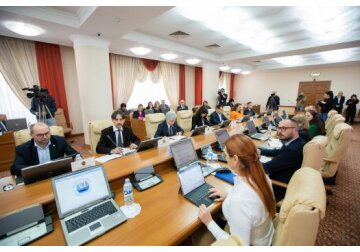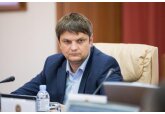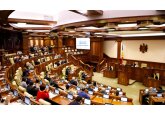
Moldova will receive a grant of 12.4 million euros for the implementation of the EIB, EBRD and EU co-financed project "Energy Efficiency in Moldova".
This is provided for by the draft ratification of the relevant grant agreement between Moldova and the European Investment Bank, which was signed on September 13. As Deputy Prime Minister, Minister of Infrastructure and Regional Development of Moldova Andrei Spinu noted, the European Bank for Reconstruction and Development and the European Investment Bank pledged to provide Moldova with loans of 30 million euros each for the implementation of the project. A grant of 12.4 million euros will be provided for the implementation of the project by the European Commission's Neighborhood Investment Platform (NIP) in order to reduce the financial burden of potential beneficiaries of energy rehabilitation projects in public buildings, especially local public authorities. In addition, the European Commission's Neighborhood Investment Platform will provide Moldova with a grant for technical assistance in the amount of 2.6 million euros, and another grant in the amount of 500 thousand euros will come from the Eastern Partnership Technical Assistance Trust Fund (“EPTATF”). Thus, the total budget of the project "Energy Efficiency in the Republic of Moldova" is 75.5 million euros with an implementation period of 4 years (2022-2025). Andrei Spinu noted that this will be the largest energy efficiency project in Moldova, and on the other hand, a pilot project for such initiatives, which aims to introduce the national program for improving the energy efficiency of public buildings in Moldova, the implementation of energy efficiency projects in schools, kindergartens and hospitals , whose buildings are characterized by low energy efficiency due to old construction and an acute lack of investment in work to improve their energy efficiency. As part of the Energy Efficiency in Moldova project, a national program for the energy rehabilitation of buildings throughout the country will be launched, with a focus on social facilities. The beneficiaries will be state institutions of national importance, in particular, republican hospitals, as well as institutions of local and municipal importance - kindergartens, schools, city and district hospitals. The expected effect is to reduce energy consumption and save money in the amount of almost 5 million euros per year. The list of final beneficiaries of the project will be established after the energy audit. Among the criteria for selecting institutions are specific energy consumption per square meter, energy saving potential, degree of use of the building, etc. It is planned that at the initial stage, an energy audit will be carried out in 9 hospitals to see their condition and determine the amount of investment. In particular, the Institute of Emergency Medicine, the Institute of Cardiology, the Institute of Oncology, the Institute of Mother and Child, the Republican Clinical Hospital, the Institute of Neurology and Neurosurgery, the Republican Center for Medical Diagnostics, the Balti Clinical Hospital, and the Clinical Psychiatric Hospital in Codru will pass the energy audit at the first stage. At the second stage, the list of institutions that will pass the energy audit will be longer, and after the completion of the energy audit, the exact number of institutions whose energy efficiency will be improved within the framework of the mentioned project will be determined. The objectives of the project are to improve the energy efficiency of buildings, thermal modernization of buildings, which involves the installation of modern energy-efficient equipment, heating, ventilation, air conditioning systems, the introduction of lighting systems and the distribution of thermal energy, the use of renewable energy sources, if technically possible, etc. Thanks to the implementation of the project, citizens will have access to better services, the volume of energy consumption and payments for them will decrease, and the saved funds will be directed to other development projects. The project will help strengthen the country's energy security and increase energy efficiency, help adapt socially significant buildings to work in new conditions, save energy resources, reduce emissions into the atmosphere, switch to alternative sources, renewable energy resources, and provide citizens with a decent life according to modern standards. Direct work within the framework of the project at the selected sites is scheduled to begin early next year. // 26.10.2022 — InfoMarket.







